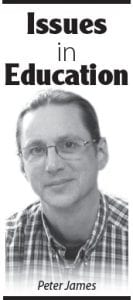Everybody is a genius. But if you judge a fish by its ability to climb a tree, it will live its whole life believing that it is stupid.
Albert Einstein
Throughout Cook County—not to mention all across Ameri ca— schools are administering standardized tests to determine whether or not students can climb a tree at grade level.
Not exactly, of course, but in the sense that students, teachers, and schools will be judged, ranked, and classified by the results of these once-ayear reading and math assessments, regardless of any other attributes.
This is not a rant against standardized tests, accountability, or even the importance of reading and math. It is a call for us to look more closely at the value inherent in each of our children and how we can develop and support a system of education that serves each of them more effectively, in order to serve a society with broad, diverse, and complex needs for educated people.
At some point around the time baby boomers reached college age, the conventional wisdom began to assert that everyone needed a college education to be successful. It became apparent soon afterward that not everyone was prepared for college, and efforts to “reform” education began in earnest.
Notably, the “No Child Left Behind” (NCLB) legislation that mandated success for every child and established a system of testing and consequences targeted 2014 as the year 100 percent of students would meet grade-level standards for reading and math. (In case you were wondering, that hasn’t happened.)
A few years ago, new legislation provided an alternative to NCLB by establishing waivers and a “Race to the Top” (presumably leaving at least some children behind) that exempted states from meeting the 100 percent requirement that nobody was going to meet anyway in order to use different methods to meet alternative sets of goals. To nobody’s surprise, the tools underlying these new strategies look remarkably like the old ones.
Minnesota continues to use the Minnesota Comprehensive Assessments (MCAs), although no longer to focus only on proficiency, but also student growth and closing the achievement gap between majority and disadvantaged students. These are steps in the right direction, but still very limited and still focused too specifically on one-time, standardized tests of reading and math skills to determine if students are on track for career and college readiness.
And what about those college dreams? Roughly half the students who start college don’t finish. Roughly half the students who have graduated from college are not working in jobs that require a four-year degree. (As an aside, nearly all of these students have managed to accumulate student loan debt.) In the meantime, even in this period of stubbornly high unemployment, hundreds of thousands of well-paying jobs go unfilled for lack of qualified welders, electronics technicians, and other skilled industrial workers.
Telling statistics regarding these issues come from the Los Angeles Unified School District, which enrolls about 660,000 students. In spite of the massive improvement efforts of the last decade, they have dropout rates over 20 percent, a 2013 graduation rate of 66.2 percent, and proficiency expectations of around 50 percent in both math and reading. (In case you didn’t do the math in your head, the third of each class that doesn’t make it to graduation is about 220,000 students every year!) In the meantime, with a focus on making progress in narrow academic areas, the district has eliminated 90 percent of its industrial arts (shop) classes.
We are not Los Angeles, and we are fortunate to have so many local initiatives that support a wide variety of learners and the varied interests and abilities they bring to our community. Still, we are trying to run public schools in an education environment that is becoming increasingly full of narrowly-focused, broadly-reaching, well-intentioned, but often misguided legislation and mandates. It is an environment full of political players of all stripes and at all levels trying to push specific agendas and proposals.
Unless we remain diligent about valuing and supporting the needs of all students—and provide the funds, programming, and flexibility necessary for their success—the pressures around us will force many students to the margins, not just academically, but socially.
While we will lose the benefits these people could have provided to our communities, they will lose the opportunity to utilize their unique gifts and live meaningful lives. In our pursuit of higher test scores, that is too high a price to pay.
Each month a representative of our local schools will offer thoughts in Issues in Education. This month’s contributor is Peter James, Great Expectations School.



Loading Comments